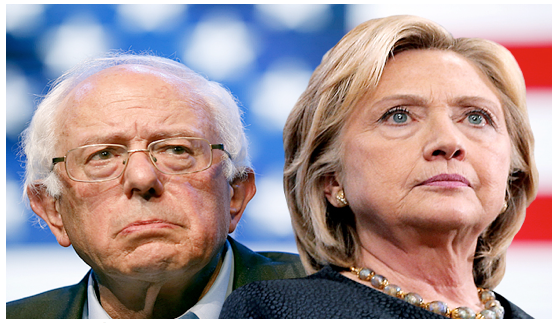CommentsGELFAND’S WORLD--Hillary and Bernie are sniping at each other seriously. Bernie's campaign is sending out emails quoting CNN, worrying that the Clinton campaign is out to discredit him.
"The Clinton campaign has been watching these Wisconsin results come in, and the delegate race of course is tight there, but the reality is they're running out of patience. So they're going to begin deploying a new strategy, it’s going to be called disqualify him, defeat him and then they can unify the party later."
Whether the Clinton intent is being accurately reported or not, we do have one recent data point. Hillary made the observation that Bernie didn't do very well in a recent interview that focused on banking regulation. Although she wouldn't say outright that Bernie is not ready for the presidency, she kind of sort of implied that based on a performance like that, maybe he just isn't the right guy. The comment was justifiable, based on the facts -- even commenters friendly to Sanders made fun of his interview performance -- but going negative is a road Hillary should consider critically, and then not go down.
It's interesting that at this point in the campaign, Hillary and Bernie have very different optimal strategies. Bernie has to take chances to win, and these chances inevitably involve taking a few potshots at Hillary. Hillary has an easier path to the nomination available to her, provided that she is willing and able to maintain her own internal discipline. That means putting up with a few Sanders snipes without firing back.
It's all got to do with two parameters. The first is the number of additional delegates each candidate needs to pick up in order to get to a majority. The second is the number of voters who will stay home on election day if their own favorite doesn't win.
As to the delegate count, the relevant numbers have been put together by Nate Silver. He calculated how spectacularly Bernie has to win in each upcoming state primary in order to get to a majority. The task is daunting. As Silvers points out, the more likely scenario is that Bernie Sanders will lose. That's where the numbers are trending right now.
This implies an obvious optimal strategy for Hillary Clinton. She should campaign on a positive note, and never say a stern word about Bernie Sanders. As far as the primary voters are told, he should be her best friend, and wonderfully qualified to lead the nation. Not only that, but she should let voters know that she and Bernie are very much on the same page in terms of policy and goals.
In other words, she should begin the job of unifying the voters around herself right now. She is looking to hold onto the people who are saying, "I'll vote for Sanders in the primary election and then, if Bernie doesn't get the nomination, I'll vote for Hillary in November." She therefore has a strong incentive to avoid doing anything to antagonize Sanders supporters.
Her optimal strategy requires only that she modify her timing: Win Sanders voters over in the long run through flattery and solidarity rather than trying to persuade them to vote against Bernie. She should position herself as the Sanders' voters' strong second choice.
Notice that this strategy is best executed by avoiding doing anything that would make Bernie mad. You're going to need his help in about 3 months, and you don't want to generate angry memories for him -- or particularly for his followers -- to dwell on.
The alternate path of attacking Sanders to win a few more primary votes -- and Silvers' calculations show that these are votes that she doesn't need -- costs her in the general election. Keep reminding yourself that a large swath of Sanders voters are not old-school, loyal Democratic Party voters, but have assembled themselves out of a younger set who seem to be motivated by idealism and a need for some real hope and change.
This group could be important in some of the swing states come November. Think of a close election in Wisconsin, and think of how many Sanders supporters there are in Madison right now.
At the moment, pollsters are reporting that as many as a quarter or even a third of Sanders supporters aren't crazy about voting for Hillary in the November election. That's a lot. On the other hand, Hillary's supporters tend statistically to be more traditional Democratic Party loyalists, and fewer report any desire to avoid voting for Bernie if it should come to that.
Political scientists and pundits refer to rebellious voters "coming home" to their party's nominee when November rolls around. A Republican who supported Perry or Carson in a long-ago primary is likely to vote for the Republican candidate on election day, even if it's "hold your nose and vote for Trump." Democrats tend to do the same thing. I can actually remember one Democrat saying, "Hold your nose and vote for Hubert Humphrey" during a particularly tumultuous election season.
But when potential voters aren't really of the party, but are merely visiting it --because Bernie Sanders has caught their ear -- it may be a different matter. Given a ballot featuring Clinton and Trump, it's hard to predict how the young rebels will divide themselves up, the choices being vote for the one, the other, or just stay home.
The advice to Hillary is to play the frontrunner's game. Don't take foolish chances, don't say anything to irritate any subset of the voters. Just play it cool and concentrate your fire on the Republicans.
Hillary and Bernie should go back to quoting Bernie's earlier line, that Hillary on her worst day is a lot better than any of the Republican candidates on his best day. Hillary should be saying exactly the same thing about Bernie.
(Bob Gelfand writes on culture, science, and politics for CityWatch. He can be reached at [email protected])
-cw
















